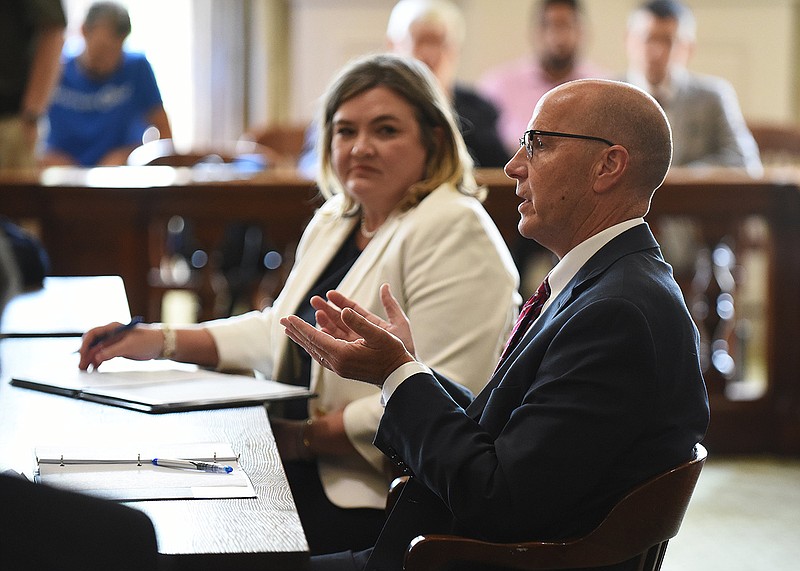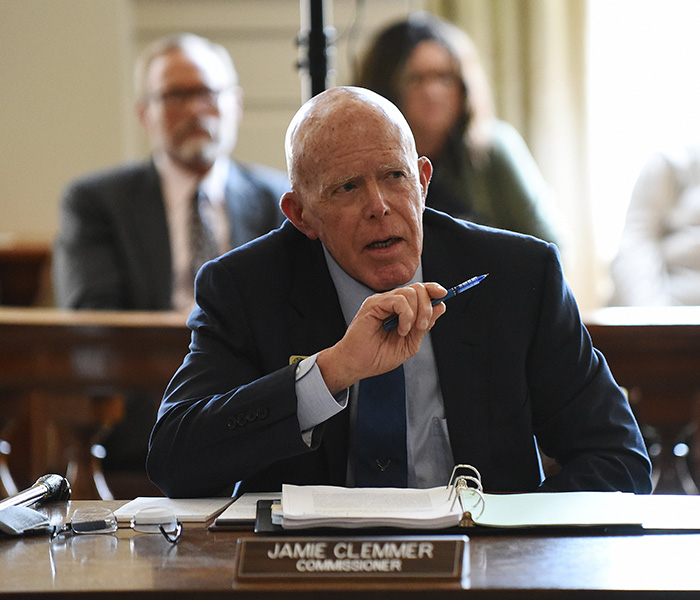The Arkansas Board of Election Commissioners denied the popular name and ballot title for a proposed constitutional amendment that would legalize recreational marijuana if passed, saying the measure did not clearly state whether there would be a certain THC limit on edibles.
Commissioners unanimously voted Wednesday not to certify the Responsible Growth Arkansas amendment that would issue adult-use cannabis cultivation and dispensary licenses to businesses that already hold licenses under the state's medical marijuana program, followed by an additional 40 licenses chosen by a lottery.
The two-page ballot title submitted to the commission states it is an amendment to the Arkansas Constitution authorizing possession and use of cannabis by adults, but it acknowledges that possession and the sale of cannabis remain illegal under federal law.
In 2016, Arkansas voters approved Amendment 98, which created the state's medical marijuana program. The amendment allows the state to license up to 40 dispensaries and eight cultivators. The Medical Marijuana Commission has issued 38 licenses across eight geographic zones so far and all eight cultivation licenses.
Steve Lancaster, counsel for Responsible Growth Arkansas, said Wednesday that the group will appeal the commission's decision to the Arkansas Supreme Court.
"We have known from the beginning that this was going to end up in the Supreme Court, so this is not a surprise," Lancaster said. "It doesn't change our tactics or what we are going to do. We will be filing a lawsuit to get to the Arkansas Supreme Court. They are the ultimate authority and the ultimate decider on the ballot title."
Lancaster said he was disappointed by the commission's decision.
"We think they got it wrong," he said. "The ballot title that we submitted clearly said what was happening and what would be the change. That didn't hold today for this group, but again, it will go to the Arkansas Supreme Court. They do this every two years. They have been doing this for years, and they know the process.
"It's the process that we followed, so we are anxious to get there for a better result."
An appeal is expected to be filed as soon as possible, Lancaster said.
Board member Bilenda Harris-Ritter, the Republican Party's designee, made the motion to deny the ballot title and popular name for the amendment partly because it would repeal the current THC limits without explaining if a new limit would be set.
THC, or tetrahydrocannabinol, is the main psychoactive compound in marijuana.
"I know they can't put every single thing in here, but I think that is significant enough," she said.
Lancaster argued that the role of the Board of Election Commissioners is not to judge the amendment itself but to see if the ballot title has language that is misleading or omits information that could change a voter's mind.
"In other words, the board should go into this process with the goal of approving the ballot title, not rejecting it," he said.
"I think it's equally important that we understand what we do not need to have," he said. "It doesn't have to be perfect or cover every legal argument that a measure might hold. It doesn't need to cover every detail, term or definition. In fact, it can't include every detail of the amendment or every consequence of a proposed amendment."
Lancaster quoted several Arkansas Supreme Court decisions related to ballot titles that he said supported the wording of Responsible Growth Arkansas' ballot title.
"We have provided a lot of information, and we believe that it satisfies the requirements of a ballot title," he told the commission.
No briefs were submitted in opposition to the proposed ballot title and popular name and no one chose to speak against it, but several commission members voiced concerns.
Board member Jamie Clemmer, a governor's designee, agreed with Ritter regarding concerns about repealing the THC limit with no further details being added in the ballot title.
"Removing the limitations of THC in a product would give me some serious reflection," he said. "If it was limited to 10 milligrams I would understand, but the limit might be 20 or 40. It doesn't say anything here. In my mind that is pretty important."
James Harmon Smith III, state Democratic Party designee, also agreed with other commission members, saying that even if he were pro-marijuana he believes not having details on a THC limit might give him pause.
"The potential negative is kids," he said. "Some of these edibles look like gummy bears, and if a kid gets it and there is no THC limit then we don't know what the effect might be.
"It was the only problem I saw, but that might be a big problem. ... I know that we need to look at this liberally, but even if I am pro on this, that little part would give me some reservation."
The proposed Responsible Growth Arkansas amendment would repeal and replace parts of Amendment 98 with requirements for child-proof packaging and restrictions on advertising that appeals to children.
The State Board of Election Commissioners' review documents state that a portion of Amendment 98 being repealed and replaced regards, among other things, a limitation of 10 milligrams of active tetrahydrocannabinol per portion.
"The problem is that the Title only describes the repeal of the constitutional provision which establishes a maximum limitation on the concentration of tetrahydrocannabinol (THC) per serving, using a reference to a legal citation with no accompanying description," the document states. "The sponsor chose to combine, in the same clause, the repeal and replacement of a provision requiring 'child proof packaging and restrictions on advertising that appeals to children.' This is despite the existing provision of law already providing for both child proof packaging and prohibitions on advertising geared towards children in greater specificity than the proposed Measure."
Lancaster said the ballot title explains that while the THC limit would be repealed, the Alcoholic Beverage Control Division will be in charge of making new rules with requirements for child-proof packaging and restrictions on advertising that appeals to children. He said the repeal of the THC limit doesn't mean the limit is gone, and argued that the ballot title explains the rules would be decided by the Alcoholic Beverage Control Division.
"It is essentially a very minor part of the amendment," Lancaster said about repealing the THC limit. "I don't believe that would necessarily cause a voter to potentially change their vote. It clearly sets out what is being repealed."
Lancaster said after the commission's decision that he thought the criticism regarding the THC limit's being repealed with no further explanation was unfair.
"The type of detail that the board expected or demanded in this case would make our ballot title thousands and thousands of words long," he said. "That is simply not workable for a ballot."
Ritter said she also was given pause after learning that those who own less than 5% of a cultivation license do not need to complete a background check.
"Wouldn't it be possible for a group of 18 people who couldn't pass a background check to get together and have ownership in 18 dispensaries?" she said.
Lancaster said it might be possible, but noted that it was a speculative concept that isn't supposed to be part of the ballot title process.
"The license still has to be issued, and there are checks and balances in place on who can get a license," he said. "It wouldn't be automatic that this group of 18 criminals would get a license."
Ritter said she was concerned because not everyone who is drawn to the marijuana industry is an "Eagle Scout," and she wanted that to be noted.
"Not everybody is bad, but not everybody is good either," she said.
Lancaster said the people he has worked with have been upright business people.
"I think there are plenty of controls within the process beyond that to take care of any concerns," he said.
Board member Wendy Brandon, Senate president pro tempore designee, said concerns regarding background checks were not for the commission to determine.
"The intent is stated there," she said. "Someone can read it and come to the same conclusion and not vote for it."
Lancaster said afterward that he understood Ritter's concern regarding background checks, but said the scenario she spoke about was "extremely unlikely."
"I thought it was speculative to the point where I didn't find it persuasive," he said.
Act 376 of 2019 shifted the responsibility of certifying a proposed ballot measure's popular name and ballot title from the attorney general to the Board of Election Commissioners.
"We take the law as we find it and I would prefer a possible different process, especially after a result like today," Lancaster said. "But, like I said, we will go to the Supreme Court and see what happens."
Certification of the ballot title and popular name is one of the two requirements under state law for a proposal to get on the general election ballot. The other requirement is for the secretary of state to certify the sponsor has submitted the required number of valid signatures of registered voters on petitions.
Petitioners for Responsible Growth Arkansas said in July they had submitted 192,828 signatures, more than twice the number required, in their bid to qualify the measure for the general election ballot.
The measure was approved by the secretary of state after signature counters reached 90,000 verified signatures last week.
Lancaster said the almost 200,000 Arkansans who signed the petition had the ballot title and popular name before them.
The initiative limits the sale of cannabis to people 21 or older and prohibits advertising and packaging designed to appeal to children. It provides regulatory oversight by limiting the number of licensed businesses, and does not allow for homegrown cannabis.
It also limits the number of cannabis licenses to 20 cultivators and 120 dispensaries statewide, which includes existing medical marijuana licenses.
Family Council President Jerry Cox said in a statement the commission's denial was good news.
"States that have legalized recreational marijuana have seen increases in drugged driving and traffic injuries," he said. "A growing body of medical research links marijuana with mental health problems. Arkansas simply does not need to legalize marijuana."
Cox also said the proposed amendment to legalize marijuana is misleading and poorly written.
"The way the amendment is written, voters would not be able to understand this proposal," he said. "It repeals, replaces, and rewrites several parts of Arkansas' medical marijuana amendment, and it adds new language to other parts of the Arkansas Constitution. It is unclear just how far-reaching some of these changes may be."
A poll published Feb. 15 by Talk Business & Politics and Hendrix College showed majority support among Arkansas voters for broadening the legalization of marijuana. About 53% of 961 likely voters surveyed said marijuana should be legal for adults 21 and older.
Currently, a simple public majority is required for approval of proposed constitutional amendments and initiated acts, but a legislative proposal set to be on the ballot in November would raise that threshold to 60% if approved.
Medical marijuana patients spent $24 million at Arkansas dispensaries in April, obtaining 4,213 pounds of cannabis, according to the Arkansas Department of Finance and Administration. On average, patients spend $22.45 million each month among the state's 38 dispensaries to purchase approximately 3,919 pounds of marijuana.
There were 88,012 active medical marijuana ID cards in the state as of July 30, according to the state Department of Health.

